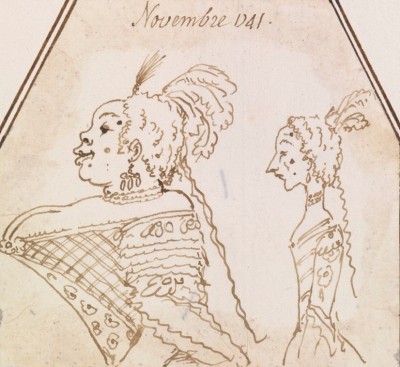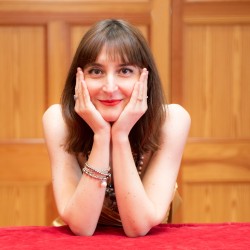Thursday 12 June - Saturday 14 June 2025
Actors, Singers and Celebrity Cultures across the Centuries
Organised under the aegis of the Theatrical Voice Research Centre, University of Surrey.
University of Surrey
Guildford
Surrey
GU2 7XH
Programme

12 June
9.15 – 10.00 REGISTRATION
10.00 – 11.30 Opera Celebrities and National Operatic Cultures
Katherine Hambridge (Durham University), ‘Gender and the German Voice’
Mahima Macchione (King’s College London), ‘Invisible Stardom: Soprano Adelina Rebussini and the Lost Opera Company of Giuseppe Ramonda, 1856'
Karen McAulay (Royal Conservatoire of Scotland), ‘Comparing the Career Trajectories of Two Scottish Singers: Flora Woodman and Robert Wilson’
11.30 – 12.00 Coffee Break
12.00 – 13.00 Prima Donnas on the 19th-Century London Stage
Jamieson Hankins (Durham University), ‘Animate Instruments: The Metaphysical Power of the Prima Donna’s Voice in Nineteenth-Century London’
Simone Di Crescenzo (Università di Bologna), ‘The “diva” myth in London: from Giulia Grisi to Rosa Ponselle’
13.00 – 14.30 Lunch
14.30 – 16.00 Race, Gender and Celebrity
Carlo Tortarolo (Conservatorio di Musica ‘F.A. Bonporti’ of Trento) and Rosa Angela Alberga (Independent Scholar), ‘Leveraging racial biases: the case of soprano Tamaki Miura’
Berta Joncus (Guildhall School of Music & Drama), ‘The Black Servant and Kitty Clive: Unsettling Relations in the Playhouse’
Rhae Lynn Barnes (Princeton University), ‘Grotesque Demands at Coontown’s Crossroads: Bob Cole and the Price of Black Celebrity on the Jim Crow Minstrel Stage’
16.00 – 16.30 Coffee Break
16.30 – 18.10 Embodiment and Celebrities
Jed Wentz (Universiteit Leiden), ‘Diving into the whirlpool: Co-creating a declamatorium with Bernhard Henrik Lulofs (1787-1849)’
Hanna Chorell (Sibelius Academy, University of the Arts Helsinki), ‘Opera singer's agency and performances of femininity – an artistic research’
Hippolyte Broud (University of Exeter), ‘The Archive Speaks Back: Towards a Trans-Historical Vocal Practice’
13 June
10.00 – 11.30 Operatic Divas
Clair Rowden (Cardiff University), ‘Jewellery, Celebrity and the Feminine Self’
Massimo Zicari (Conservatorio della Svizzera italiana – Lugano), ‘Opera stardom in the early 20th century: Luisa Tetrazzini the dissolute’
Malo Maleszka (École Normale Supérieure de Lyon), ‘Maria Callas’s open letters in the late Fifties: an idea of the artist’s stance’
11.30 – 12.00 Coffee Break
12.00 – 13.00 Keynote address
Hilary Poriss (Northeastern University), ‘The Prima Donna as Teacher: Pauline Viardot and Her Students’
13.00 – 14.30 Lunch
14.30 – 16.10 Gender, Aging, Disability and Celebrity
Susannah Self (Conductor, Composer, Singer and Independent Scholar), ‘Corset Story’
Daniele Palma (University of Firenze), ‘Ageing div*s and vocal pedagogy: Negotiating stardom in the classroom’
Echo Lee Davidson (University of Pittsburgh), ‘“I Cain’t Say No”: Disability, Race, and the Politics of Revival in Oklahoma! (2019)’
16.10 – 16.40 Coffee Break
16.40- 18.20 Singers and Celebrity
Salvatore Morra (University of Cambridge), ‘Matilde Juva Branca as an Example of European Celebrities Articulated in Ottoman Egypt (1843)’ (snapshot)
Riccardo La Spina (Independent Scholar). ‘By any other name: Celebration and Deconstruction of Madrid's Ópera Italiana Stars in The Critical Press (1821-1822)’
Katherine K. Preston (College of William & Mary, Williamsburg), ‘A Nineteenth-Century American Operatic Celebrity: Emma Abbott, “the People’s Prima Donna”’
Johanna Talasniemi (University of the Arts Helsinki), ‘Singers of the First Recordings of Sibelius’s Solo Songs in the 1930s and 1940s’
14 June
10.00 – 11.30 Celebrity and the Media
Kimberly Soby (University of Connecticut), ‘Beyond the Spotlight: Chappell Roan and Celebrity in the Digital Age’
Martine Mussies (Maastricht University), ‘King Alfred on Stage and Screen: Comparing 19th-Century German Operas and Modern Media Representations’
Vinzent Wesselman (University of Oxford), ‘Imported Deviance: Conformity, Halbstarke, and American Celebrity Culture in Postwar Germany’
11.30 – 12.00 Coffee Break
12.00 – 13.00 Celebrity on 18th-Century French Primary Stages
Sabine Chaouche (Independent Scholar), ‘Stardom and Scandal: The “Queens’ Quarrel” (1779) as an Early Example of Cancel Culture?’
Lola Salem (University of Oxford), ‘Constructing Celebrity: Female Singers, Career Strategies, and Media at the Paris Opéra During the Ancien Régime’
13.00 – 14.00 Lunch
14.00 – 15.00 Celebrity and early 20th-Century French Culture
Eric Sauda (independent Scholar), ‘The Predictable Success of Popular French songs during the “Roaring Twenties”’
Madison Spahn (City University of New York), ‘Yvette Guilbert in America: Performing National Identity through “Great Songs of Great France”’
15.00 – 15.30 Coffee Break
15.30 - 17.00 Final Roundtable (Details TBC)
Registration will open soon!
Given our focus on technologies, we are delighted to host the conference at Studio 1 at the University of Surrey that––designed to a very high acoustic specification––will secure seamless audio and video broadcasting of the event via the Theatrical Voice Research Centre YouTube channel, https://www.youtube.com/@TheatricalVoiceResearchCentre.
Programme committee
- Barbara Gentili, University of Surrey
- Nicolò Palazzetti, La Sapienza University of Rome
- Clare Siviter, University of Bristol
- Jed Wentz, Leiden University
- Emmanuela Wroth, University of Cambridge
Image credit:
Anton Maria Zanetti, Vittoria Tesi Tramontini and Antonia Negri Tomi, 1741.
Pen and brown ink. RCIN 907413
© Royal Collection Enterprises Limited 2024 | Royal Collection Trust

